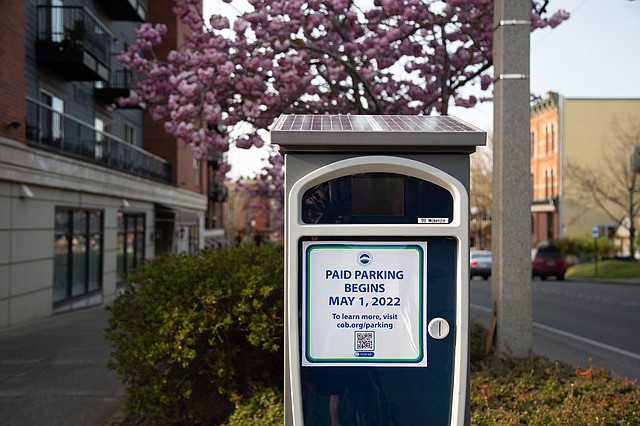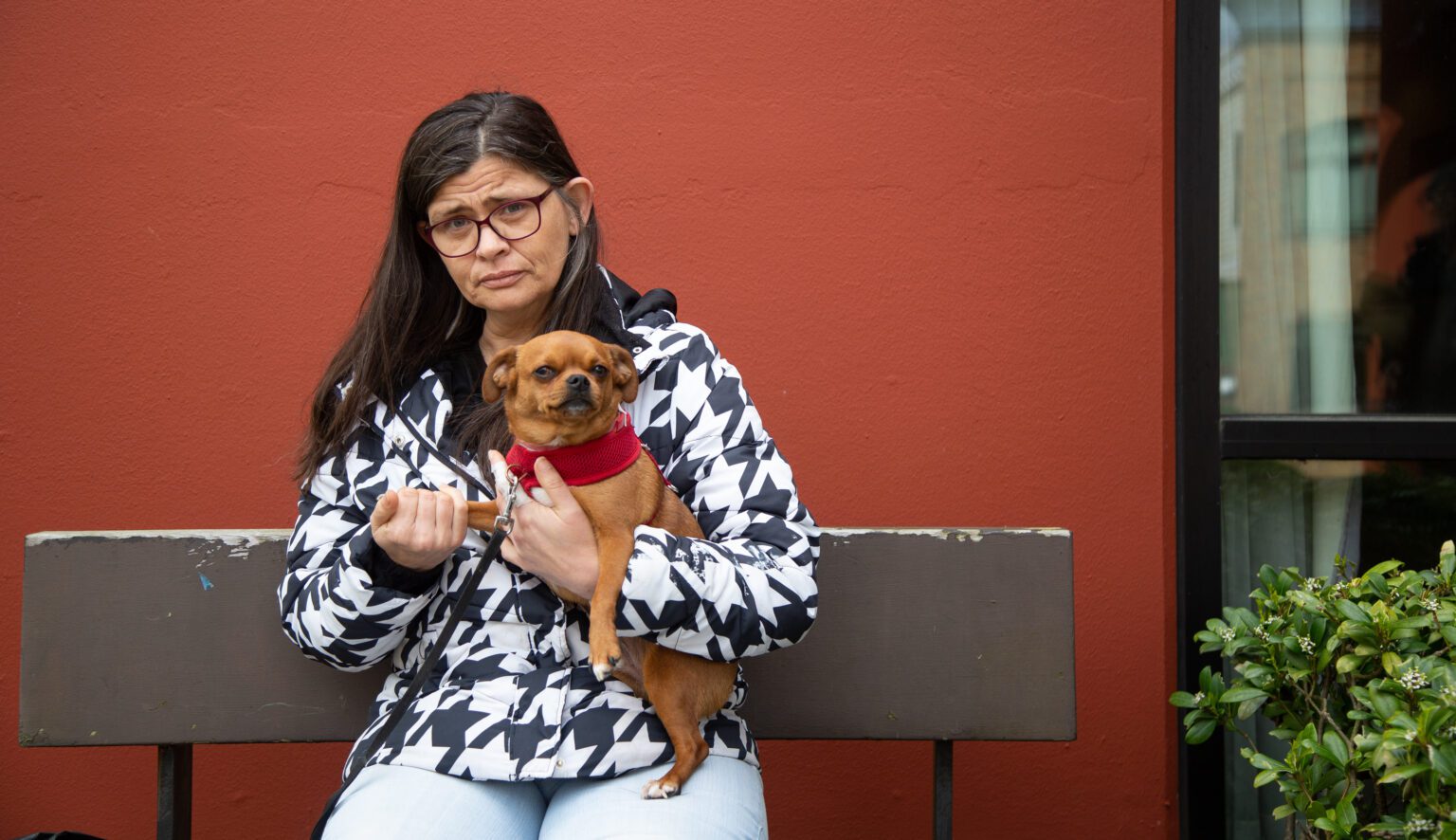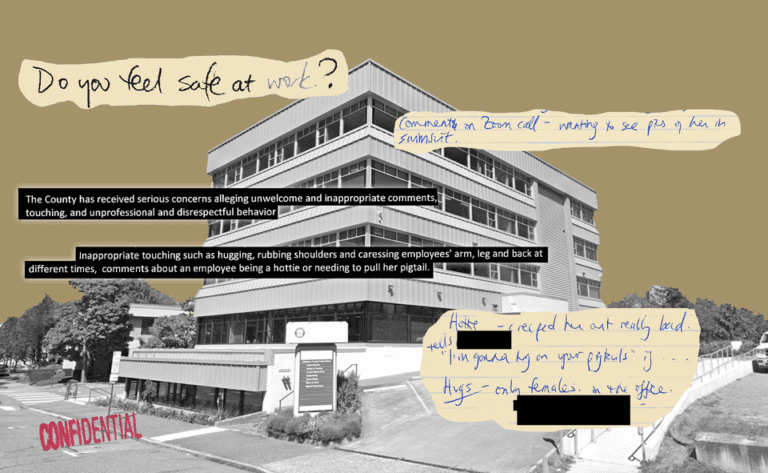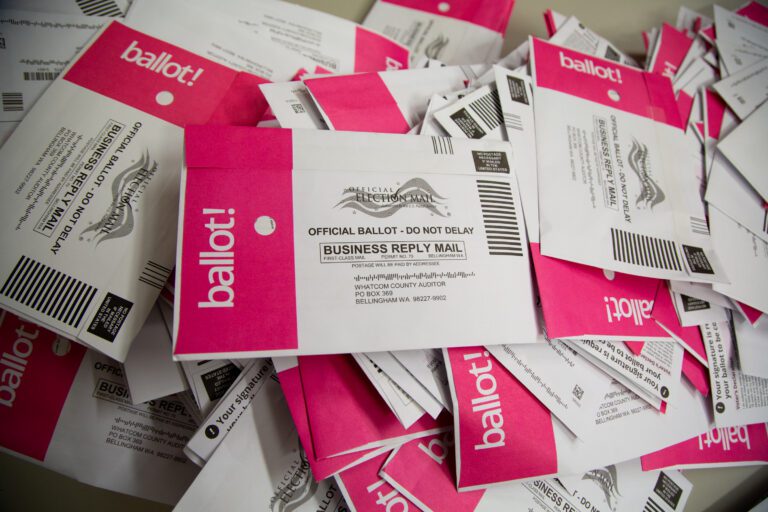Historic change is coming to historic Fairhaven.
For the first time ever, visitors to the commercial center on Bellingham’s south side must pay for parking starting May 1 — unless Dirty Dan Harris managed a horse-and-buggy parking structure we don’t know about.
Paid parking comes after decades of studies and a number of measures intended to manage the neighborhood’s increasing parking demand. Eventually, parking became enough of a squeeze that a study in late 2018 recommended charging drivers a fee for the privilege of taking up spaces.
Hence the pay stations installed on just about every street corner in Fairhaven, ready to accept money starting May 2 (since May 1 is a Sunday).
 Parking pay stations have already been installed in Fairhaven, where people will need to pay for parking starting in May. (Hailey Hoffman/Cascadia Daily News)
Parking pay stations have already been installed in Fairhaven, where people will need to pay for parking starting in May. (Hailey Hoffman/Cascadia Daily News)
Change is never easy, and it’s no surprise that people are unhappy with Bellingham’s new parking regime, which is coming to Fairhaven and downtown both.
The hourly rate for parking downtown increases to $1, which is the same rate that will be charged in Fairhaven. Paid parking will be enforced on Saturdays, too, not just weekdays. The City Council also voted to increase the citation for illegal parking from $15 to $30.
The city promotes the parking changes as benefiting businesses. Higher fees should make it easier for customers to find parking, including on Saturdays. That 2018 study counted a thousand more parked cars in Fairhaven on a Saturday, compared to 2012.
In an interview, City Council member Michael Lilliquist emphasized the benefit for businesses while conceding that the new parking regulations weren’t the “win-win” politicians like to tout.
“If you’re an employee or a resident, it’s not going to work for you,” Lilliquist said.
Some Fairhaven residents are angry over paid parking. Even a prominent business leader expressed disappointment over how the city handled it.
Low-income residents hit hard
Chuckanut Square, the low-income housing high-rise on 12th Street in Fairhaven, has 101 units and only 21 parking spaces. Officials at the Bellingham Housing Authority, which manages Chuckanut Square, estimate that another 30 residents use on-street parking.
Shaylene Wright, visiting with neighbors outside the front entrance with her dog Oscar one recent morning, described the parking situation in blunt terms.
“This is going to suck,” she said.
“Everybody here is here for a reason,” she added. Some residents have mental or physical disabilities, Wright said, and some have financial limitations. “None of us can afford to pay for parking.”
David Finet, the chair of the Bellingham Housing Authority’s board of commissioners, spoke for residents in a letter to the City Council in October 2021.
“An increase in parking rates is unlikely to harm residents with financial means,” Finet wrote. “It will, however, deeply challenge low-income individuals without the ability to pay for parking or walk, bike or easily utilize public transportation.”
The council responded by giving an 80% discount to subsidized-housing tenants on a $65-a-month permit that allows people to park on McKenzie Avenue between 10th and 11th streets.
The council’s graciousness proved to be of little help. The city sold all of the 70 or so permits made available for those 50 spaces on McKenzie before some people even knew they were for sale — including Housing Authority Executive Director Brien Thane.
“We were trying to monitor when the permits were going to come up for sale so we could inform our residents,” Thane said — to no avail.
He didn’t learn the permits were available, he said, until a tenant complained she couldn’t buy one.
A city official told the tenant, Jacqueline Kaufman, that she would be No. 18 on the waitlist.
“What good does a discount, even a deep discount on a parking permit do, if you can never get the permit?” Kaufman said. “There’s people in my building that can’t hardly walk a block or anything. I don’t see how this can be legal.”
Kaufman hasn’t been able to qualify for a disabled parking placard, but she said she will try again. The placard or a disabled-parking license plate enables a driver to park in metered street spaces for free.
Not so good for business
As executive director of the Fairhaven Association, Scott Ward’s job is to look out for the interests of his member businesses. From his perspective, the new parking rules applied in Fairhaven are flawed.
The city made a mistake, Ward said, when it reduced three blocks of unregulated parking on McKenzie to one block of all-day parking with the permit. The other two blocks will be pay-by-the-hour, along with the rest of commercial Fairhaven. Employees and business owners have been using all three McKenzie blocks to park for the day, Ward said.
“It’d be great if the city would consider expanding that permitted parking,” he said.
Ward also said city officials told business owners an off-street parking structure for Fairhaven would be in the works by the time paid parking was instituted. That didn’t happen.
“If the city were really paying attention and doing what they were supposed to be doing, we would have some hopeful thing to be looking forward to as far as parking goes,” Ward said. “There is no looking forward, and this is how it is.”
The city is looking into the future to an extent, although not enough to satisfy Ward.
Officials intend to secure off-site parking at some as-yet-undetermined location in exchange for development approval at “the pit,” the informal name for the gravel parking lot in Fairhaven between 10th and 11th streets, along Mill Avenue. Bellingham Public Works Director Eric Johnston said negotiations are underway between the city and the pit’s developer to make that happen.
Parking’s ‘harsh reality’
One of the prevailing motivations at City Hall is to discourage people from using cars. The resolution adopting new parking fees, approved by the City Council in January, mentions reducing greenhouse gas emissions as a justification for the change.
January’s parking resolution wasn’t the first time Bellingham has tried to steer residents away from cars. Rules adopted over the past decade or so to regulate residential development in Fairhaven require less than one parking space per resident.
Given the math, it’s easy to understand why so many Fairhaven residents rely on on-street parking.
Johnston, who was heavily involved in developing the new parking rules, said the changes coming to Fairhaven and the downtown are part of a “harsh reality” about parking.
“We will never build enough parking to store cars,” he said. To do so would run counter to providing affordable housing, which officials see as a higher priority.
“Do we want to invest our public dollars in a place that stores cars, or do we want to invest our dollars in people?” Johnston said.
He put it another way: “We should not make it cheaper to park your car than to ride the bus.”
The city intends to track parking demand and make adjustments on the fly, which could improve the situation for Fairhaven residents and employees. For now, however, the only change that’s certain is the one written into the January resolution: Parking is going up to $1.50 an hour in 2023.




